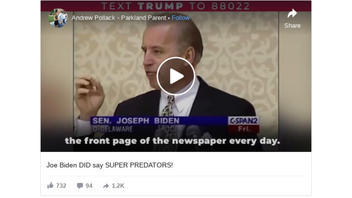
Did Joe Biden call young Black criminals "super predators"? No, that's not true: He used the term "predators" multiple times when giving speeches in support of the The Violent Crime Control and Law Enforcement Act of 1994, which he co-authored, but he never explicitly referred to those predators as Black. It was Hillary Clinton, then first lady, who used the term "super predators" in 1996 when speaking about her husband's anti-crime agenda.
The claim appeared in a Facebook post archived here) published by "@meadmovement" on October 23, 2020. The caption read:
Joe Biden DID say SUPER PREDATORS!
This is what the post looked like on Facebook at the time of writing:
(Source: Facebook screenshot taken on Fri Oct 23 13:48:58 2020 UTC)
Nowhere in the video compilation included in the Facebook post or any other videos does Biden use the term "super-predator," only "predator."
This claim resurfaced in the final presidential debate, October 22, 2020, when President Trump falsely accused Biden of calling Black Americans "super predators." Trump said:
He never did a thing except in 1994 when he did such harm to the Black community, and he called them super predators, and he said it, super predators.
In the first 2020 presidential candidates' debate on September 29, 2020 Trump also wrongly accused Biden of using the term. "You did a crime bill, 1994, where you call them super predators. African-Americans are super predators and they've never forgotten it. They've never forgotten it," Trump said.
Trump also used this line of attack against Hillary Clinton during the 2016 presidential race, in which he was factually correct when he criticized her for using the term.
Clinton most famously used the phrase while campaigning for passage of the Biden-co-authored crime bill, which her husband, then-President Bill Clinton, urged Congress to adopt, and which he signed into law. "They are not just gangs of kids anymore," Hillary Clinton said in a 1996 speech in Keene, New Hampshire. "They are often the kinds of kids that are called 'superpredators.' No conscience, no empathy. We can talk about why they ended up that way, but first we have to bring them to heel."
The racial loading comes from the person who coined the term, who said hopeless and violent youths would be most prevalent in Black communities. In 1995, the criminologist and political scientist John Dilulio was invited to the White House to speak with President Clinton about juvenile crime. "President Clinton took copious notes and asked lots of questions," Dilulio wrote in a Washington Examiner article titled "The Coming of the Super-Predators." In that same article, Dilulio wrote the following:
We're talking about kids who have absolutely no respect for human life and no sense of the future. In short, we're talking big trouble that hasn't yet begun to crest. And make no mistake. While the trouble will be greatest in black inner-city neighborhoods, other places are also certain to have burgeoning youth-crime problems that will spill over into upscale central-city districts, inner-ring suburbs, and even the rural heartland.
On the horizon, therefore, are tens of thousands of severely morally impoverished juvenile super-predators. They are perfectly capable of committing the most heinous acts of physical violence for the most trivial reasons (for example, a perception of slight disrespect or the accident of being in their path)... They live by the meanest code of the meanest streets, a code that reinforces rather than restrains their violent, hair-trigger mentality. In prison or out, the things that super-predators get by their criminal behavior -- sex, drugs, money -- are their own immediate rewards. Nothing else matters to them. So, for as long as their youthful energies hold out, they will do what comes "naturally": murder, rape, rob, assault, burglarize, deal deadly drugs, and get high.
To the extent Clinton and his administration adopted Dilulio's theories on juvenile crime and super predators, Dilulio's assertion that super-predators would be most prevalent in urban Black enclaves racialized the term. Dilulio went on to head President George W. Bush's White House Office of Faith-based and Community Initiatives. During her 2016 bid for the presidency, Hillary Clinton apologized for using the term.


















